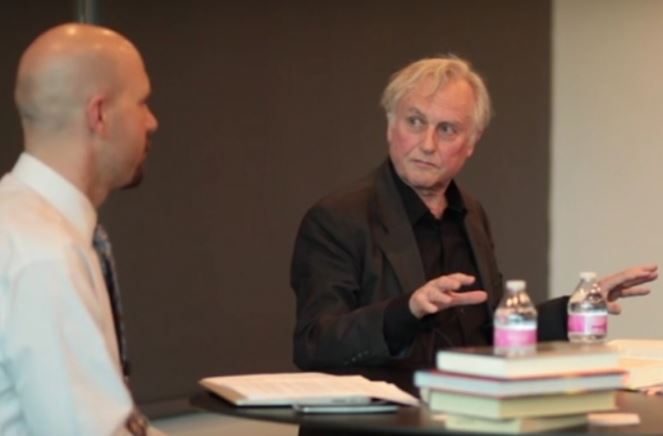









 This is the first in a new category of blog – Q and A. Every now and then I get an email or a message via Facebook with a question related to something that somebody has just read at the blog or in an article, or heard in a podcast episode – or maybe just a question out of the blue about an issue in theology, philosophy or biblical studies. I haven’t answered every such question and I can’t do so in future either – not because I don’t appreciate being asked, but sometimes I’ve got a pile of emails sitting there and I just can’t justify replying to all of them, nor could I necessarily do so even if I tried. I’m really sorry if you’re one of those people who I haven’t replied to. This is what I do in my spare time.
This is the first in a new category of blog – Q and A. Every now and then I get an email or a message via Facebook with a question related to something that somebody has just read at the blog or in an article, or heard in a podcast episode – or maybe just a question out of the blue about an issue in theology, philosophy or biblical studies. I haven’t answered every such question and I can’t do so in future either – not because I don’t appreciate being asked, but sometimes I’ve got a pile of emails sitting there and I just can’t justify replying to all of them, nor could I necessarily do so even if I tried. I’m really sorry if you’re one of those people who I haven’t replied to. This is what I do in my spare time.
The Q and A category is one of the avenues I’m going to use to reply to some of these questions as best I can, albeit briefly. I especially welcome questions that are related to material in the blog or podcast, or material that I’ve had published somewhere. That’s just because I’m more likely to be able to answer the question if it’s in a subject I’ve dealt with before. But I’m open to any questions you have. At least every two weeks (maybe more often, depending on what time allows) I’ll publish one of those questions at the blog in the Q and A category along with my response. You can view previous Q and A blog entries by viewing the Q and A subject in the Subject drop down box over on the right, or by clicking on the Q and A button.
I don’t promise to be able to respond to every email (in fact I can promise that I won’t), but we’ll see how this goes!
The very first question in this series comes from Paulo in Indiana.
“I wonder, what is your view on privation theories of evil? Do you see certain limitations or weaknesses in these types of explanations?”
Thanks for the question Paulo. Talk about starting with a big one! A really satisfying answer to this would require a book length response (and I’m sure I will find myself saying this in reply to a lot of questions), but here are some summary thoughts.
Read More




 A few years ago my article “The Epistemological Objection to Divine Command Ethics” was published. In it, I address a particular objection to a divine command theory of ethics. That objection is as follows: If the property of being morally required is the same as the property of being commanded by God, then people who do not believe in God cannot know that they have moral obligations, since they do not know that they have been commanded by God. But it’s part of the nature of moral obligations that people understand why they have them. So let’s reject a divine command theory of ethics. An epistemological argument is one that is concerned with what a person knows (or whether or not they can know something) and how they know it. In the process of making the argument I name a few philosophers who have made variants of this argument, but I focus mostly on Wes Morriston’s argument due to its detail and care.
A few years ago my article “The Epistemological Objection to Divine Command Ethics” was published. In it, I address a particular objection to a divine command theory of ethics. That objection is as follows: If the property of being morally required is the same as the property of being commanded by God, then people who do not believe in God cannot know that they have moral obligations, since they do not know that they have been commanded by God. But it’s part of the nature of moral obligations that people understand why they have them. So let’s reject a divine command theory of ethics. An epistemological argument is one that is concerned with what a person knows (or whether or not they can know something) and how they know it. In the process of making the argument I name a few philosophers who have made variants of this argument, but I focus mostly on Wes Morriston’s argument due to its detail and care.


 Occasionally, when somebody first hears about divine command ethics (the view that what is right or wrong is what God commands or forbids), the response is one of incredulity: “What? You believe THAT?! So if God commanded you to kill that person over there, you would do it? Really?” And right there, whether the critic realises it or not, there is almost certainly a double standard at work. Read on to see why.
Occasionally, when somebody first hears about divine command ethics (the view that what is right or wrong is what God commands or forbids), the response is one of incredulity: “What? You believe THAT?! So if God commanded you to kill that person over there, you would do it? Really?” And right there, whether the critic realises it or not, there is almost certainly a double standard at work. Read on to see why. In this episode I continue to re-trace my steps through my mini speaking tour earlier this year. This talk was the second in a series of introductory talks on apologetics. In it, I introduce and explain the moral argument for the existence of God.
In this episode I continue to re-trace my steps through my mini speaking tour earlier this year. This talk was the second in a series of introductory talks on apologetics. In it, I introduce and explain the moral argument for the existence of God. This is the first in a new category of blog – Q and A. Every now and then I get an email or a message via Facebook with a question related to something that somebody has just read at the blog or in an article, or heard in a podcast episode – or maybe just a question out of the blue about an issue in theology, philosophy or biblical studies. I haven’t answered every such question and I can’t do so in future either – not because I don’t appreciate being asked, but sometimes I’ve got a pile of emails sitting there and I just can’t justify replying to all of them, nor could I necessarily do so even if I tried. I’m really sorry if you’re one of those people who I haven’t replied to. This is what I do in my spare time.
This is the first in a new category of blog – Q and A. Every now and then I get an email or a message via Facebook with a question related to something that somebody has just read at the blog or in an article, or heard in a podcast episode – or maybe just a question out of the blue about an issue in theology, philosophy or biblical studies. I haven’t answered every such question and I can’t do so in future either – not because I don’t appreciate being asked, but sometimes I’ve got a pile of emails sitting there and I just can’t justify replying to all of them, nor could I necessarily do so even if I tried. I’m really sorry if you’re one of those people who I haven’t replied to. This is what I do in my spare time.